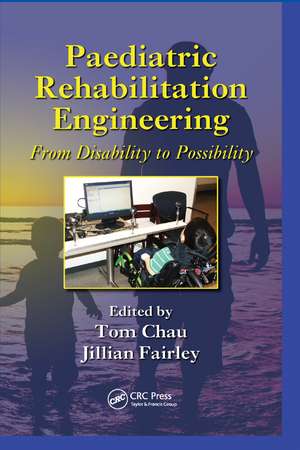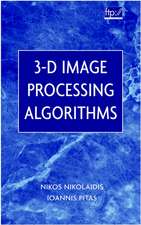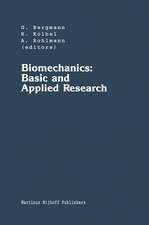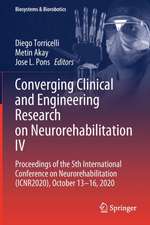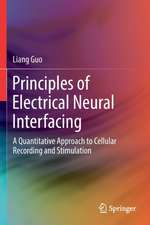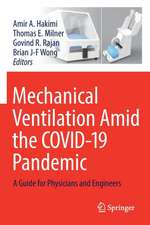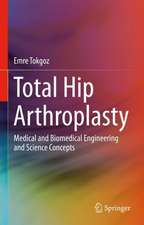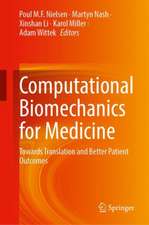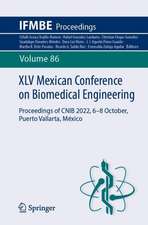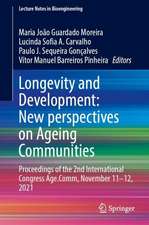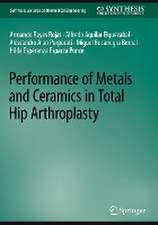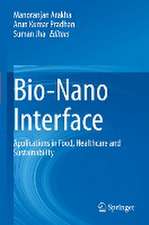Paediatric Rehabilitation Engineering: From Disability to Possibility: Rehabilitation Science in Practice Series
Editat de Tom Chau, Jillian Fairleyen Limba Engleză Paperback – 14 noi 2018
The book is divided into three complementary components. The first group of chapters is broadly concerned with connecting individuals to their environment and to the people around them. The second group revolves around paediatric technologies that compensate for compromised or missing function. The final group of chapters is about machines and environments which provide stimulating and interactive platforms for therapy and research.
Topics include:
- Microswitch-based occupational, recreational and rehabilitation programs
- Emerging access technologies, like infrared thermal imaging and vocal cord vibration detection
- Communication technologies to enable children to communicate in a variety of everyday environments
- Accessible graphical user and Web-based interface design
- Postural and upper and lower extremity compensation, such as customized chairs and prostheses
- Global efforts in the area of robotics for autism research
- Virtual reality and other interfaces to mitigate motor, communication, and physical control difficulties
| Toate formatele și edițiile | Preț | Express |
|---|---|---|
| Paperback (1) | 461.03 lei 6-8 săpt. | |
| CRC Press – 14 noi 2018 | 461.03 lei 6-8 săpt. | |
| Hardback (1) | 1225.18 lei 6-8 săpt. | |
| CRC Press – 17 dec 2010 | 1225.18 lei 6-8 săpt. |
Din seria Rehabilitation Science in Practice Series
- 15%
 Preț: 571.98 lei
Preț: 571.98 lei - 8%
 Preț: 391.91 lei
Preț: 391.91 lei -
 Preț: 357.75 lei
Preț: 357.75 lei - 5%
 Preț: 359.29 lei
Preț: 359.29 lei - 5%
 Preț: 345.62 lei
Preț: 345.62 lei - 21%
 Preț: 446.23 lei
Preț: 446.23 lei - 15%
 Preț: 585.27 lei
Preț: 585.27 lei - 27%
 Preț: 454.52 lei
Preț: 454.52 lei - 27%
 Preț: 456.63 lei
Preț: 456.63 lei - 15%
 Preț: 568.28 lei
Preț: 568.28 lei - 23%
 Preț: 940.83 lei
Preț: 940.83 lei - 23%
 Preț: 368.98 lei
Preț: 368.98 lei - 18%
 Preț: 1245.81 lei
Preț: 1245.81 lei - 15%
 Preț: 577.12 lei
Preț: 577.12 lei - 18%
 Preț: 807.03 lei
Preț: 807.03 lei - 28%
 Preț: 427.84 lei
Preț: 427.84 lei - 18%
 Preț: 319.68 lei
Preț: 319.68 lei - 18%
 Preț: 320.94 lei
Preț: 320.94 lei - 22%
 Preț: 372.54 lei
Preț: 372.54 lei - 15%
 Preț: 430.96 lei
Preț: 430.96 lei - 18%
 Preț: 786.38 lei
Preț: 786.38 lei -
 Preț: 443.11 lei
Preț: 443.11 lei - 26%
 Preț: 763.78 lei
Preț: 763.78 lei
Preț: 461.03 lei
Preț vechi: 542.39 lei
-15% Nou
Puncte Express: 692
Preț estimativ în valută:
88.22€ • 92.44$ • 72.93£
88.22€ • 92.44$ • 72.93£
Carte tipărită la comandă
Livrare economică 11-25 aprilie
Preluare comenzi: 021 569.72.76
Specificații
ISBN-13: 9781138374157
ISBN-10: 1138374156
Pagini: 368
Ilustrații: 12 Tables, black and white; 91 Illustrations, black and white
Dimensiuni: 156 x 234 mm
Greutate: 0.45 kg
Ediția:1
Editura: CRC Press
Colecția CRC Press
Seria Rehabilitation Science in Practice Series
ISBN-10: 1138374156
Pagini: 368
Ilustrații: 12 Tables, black and white; 91 Illustrations, black and white
Dimensiuni: 156 x 234 mm
Greutate: 0.45 kg
Ediția:1
Editura: CRC Press
Colecția CRC Press
Seria Rehabilitation Science in Practice Series
Public țintă
Academic and Professional Practice & DevelopmentCuprins
Introduction to 21st Century Pediatric Rehabilitation Engineering. Assistive Technology for Cognitive Rehabilitation in Children. Mobile Robotics in the Treatment of Autism. Advances in Pediatric Augmentative and Alternative Communication. Upper Extremity Prosthetics for Children and Youth. Virtual Reality Therapy in Pediatric Rehabilitation. Innovations in Switch Access for Children and Youth with Profound Disabilities. Physiological Access Modalities: Body Talk for Nonverbal Children.
Notă biografică
Tom Chau is a Senior Scientist and Theme Leader of Innovation and Development at the Bloorview Research Institute, the largest pediatric academic rehabilitation hospital in Canada.
Descriere
Written by international experts, this book provides an up-to-date synopsis of advances in research in pediatric rehabilitation engineering. Offering a single comprehensive resource on the latest findings, each chapter details a particular area of technology or those developments of particular clinical relevance to pediatric rehabilitation. Each chapter also includes a conceptual description of the technology or underlying scientific principles, followed by a synthesis of relevant literature, recent research advances, selected clinical case studies (where applicable), and perspectives for future directions.
